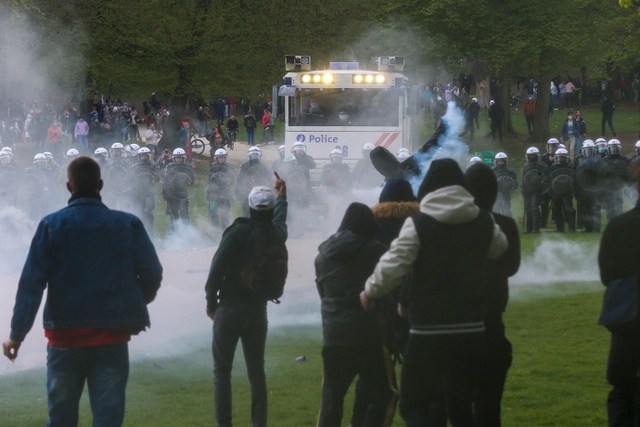Around three-quarters of young people in Brussels don't feel safe when in contact with police, while a majority thinks that police checks and searches often involve ethnic profiling.
When it comes to how the police make them feel, around half of respondents said they felt anger and fear. Just 12% of the respondents feel respect for the police, according to the survey by the Youth Council of the Flemish Community Commission (VGC), which aimed to give young people a voice when it comes to their relationship with the institution for law and order.
"These figures hit all parties hard," said Ilyas Mouani, chairman of the VGC Youth Council, adding that the report also highlighted the fact that young people's knowledge of their rights and obligations is "far from adequate."
Just short of seven in ten respondents said they were not correctly informed about what their rights and obligations are when they come into contact with the police, and those who felt they were well informed indicated that they were taught about it by family and friends (56%), the internet (56%), or at school (35%).
Strikingly, just 11% of respondents were informed about their rights about the police, while around 30% of those who were not informed would like the police to give them more information about what their rights are.
Related News
- Government looks to fix 'increased tension' between youth and police
- Youth unemployment in Brussels reaches pre-Covid level
In general, female respondents felt safer with the police than male respondents, in part explained by the fact that male respondents were significantly more likely to be checked or arrested than young women.
When approached by the police, young men are around seven times more likely to experience verbal and physical violence than young women as just 3% of female respondents indicated they had experienced such aggression, compared to 22% of male respondents.
Meanwhile, 68% think that there was ethnic profiling involved when police carried out checks, searches and arrested young people. This sentiment was stronger among male respondents (71%) than among their female peers (63%).
Young people want change
Between 19 February and 7 March this year, the survey questioned 1,968 young people in Brussels, which the VGC Youth Council said was "not enough to be representative, but enough to serve as an impression of how the youth relates to the region's police force."
Mouani argued that the large number of young people who responded in such a short timeframe "shows how sincere this subject is for the young people and that they really want to see change". This was also mirrored in the report, which indicated that more than nine in ten respondents believe that the relationship between young people and the police should improve.
On a regional level, Brussels State Secretary Pascal Smet is freeing up €100,000 to fund a pilot project that aims to improve the relationship between citizens and the police on a local level, while the Federal Government set up a working group that will optimise the procedure police officers follow when dealing with children and young people during interventions.
"By understanding each other’s needs and adapting the approach and procedures of the police to young people, we restore trust in each other," Home Affairs Minister Annelies Verlinden said.

